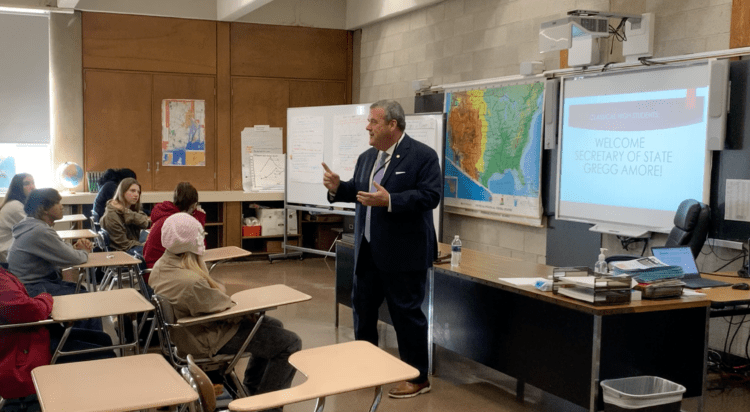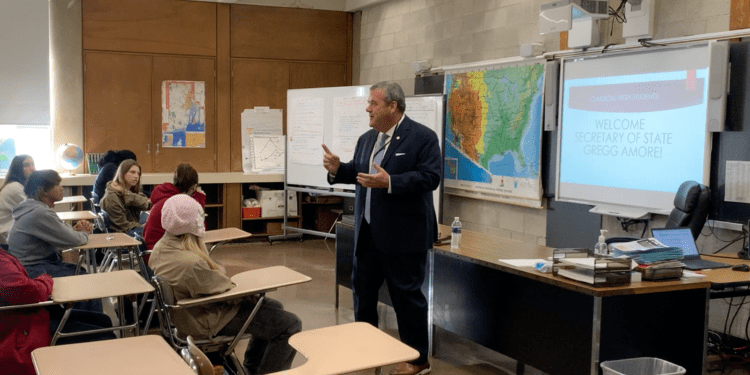Erik J. Chaput and Russell J. DeSimone
| Guest columnists

Gregg Amore goes from the State House to the classroom on a civics mission
Secretary of State Gregg Amore has a boots-on-the-ground approach to promoting civics education in Rhode Island.
Amy Russo, The Providence Journal
This week we celebrate Constitution Day, commemorating the signing of the U.S. Constitution on Sept. 17, 1787. Educators should take advantage of the incredible, multi-volume series with hundreds of invaluable documents on Rhode Island and the ratification process that is available online through University of Wisconsin Libraries’ Digital Collections.
The landmark Documentary History of the Ratification of the Constitution series includes four volumes on Rhode Island, a state that boycotted the constitutional convention and was the last to ratify. The General Assembly refused to send delegates to the convention at Philadelphia in the summer of 1787 by a 2-1 margin in large part because it feared it would lose its ability to print paper money.
More: Historical parallels between Trump ballot case, RI’s Dorr Rebellion | Opinion
Whereas other states called conventions to debate the Constitution (as prescribed by Article VII), it fell to Rhode Island to become the last of the original 13 states to ratify the Constitution. For three tumultuous years the state’s freemen virulently contested the Constitution. Defiant as always, Rhode Island initially called for an up-or-down vote in the 30 towns. The Constitution was overwhelmingly defeated in a referendum held in March 1788.
When George Washington took the oath of office as the nation’s first president in New York City the following year, Rhode Island was a foreign nation. A year later, in April 1790, with Rhode Island still outside the Union, the U.S. Senate considered sanctions against the recalcitrant state. Several weeks later, these measures passed.
In a mocking tone, Vice President John Adams asked prominent Providence merchant John Brown if Rhode Island was desirous of having President Washington send an “Ambassador in great Pomp” to the state to beg them to join? In another letter, Adams, never one to hold back in his correspondence, lambasted the “blockheadly ignorance and stupidity” of Rhode Islanders’ “treacherous” citizens for failing to adopt the Constitution.
The Rhode Island ratification records, dutifully organized by historians over the course of many years, including Rhode Island Historian Laureate Patrick T. Conley, demonstrate the raucous, prolonged fight that played out in the state’s robust press, in various state conventions, and likely at family dinner tables, in school houses, and at tavern bars for nearly four years. As Virginian’s James Madison noted towards the end of Washington’s presidency, the true meaning of the Constitution, “beyond the face of the instrument” should be sought in the ratification process at the state level, a process that breathed “life and validity” into the document.
More: What good are rights under RI Constitution if you can’t enforce them? That might change.
The ratification vote that took place in Newport’s Colony House on May 29, 1790, was extremely close, but the document was finally acceded to 34 to 32 (the slimmest margin of any state). If the two Anti-Federalist delegates from Block Island had been present, and if chairman Daniel Owen from Glocester could have voted, deadlock would have ensued. Because of overflow crowds at the Colony House, the delegates were actually forced to finish their deliberations in the Second Baptist Church.
The colony that helped, ironically, to pioneer the concept of the separation of church and state ratified the Constitution in a house of worship.
Historians Erik J. Chaput and Russell J. DeSimone are the co-creators of the Dorr Rebellion Project website hosted by Providence College. They have written extensively on Rhode Island history for nearly 20 years.
Source link : http://www.bing.com/news/apiclick.aspx?ref=FexRss&aid=&tid=66e6b5b8125e40d3999f12b340852d19&url=https%3A%2F%2Fwww.providencejournal.com%2Fstory%2Fopinion%2Fcolumns%2F2024%2F09%2F15%2Fnations-founders-heaped-wrath-and-scorn-on-the-state-before-the-document-was-approved-in-1790%2F75105444007%2F&c=4666579581366864653&mkt=en-us
Author :
Publish date : 2024-09-14 13:00:00
Copyright for syndicated content belongs to the linked Source.



